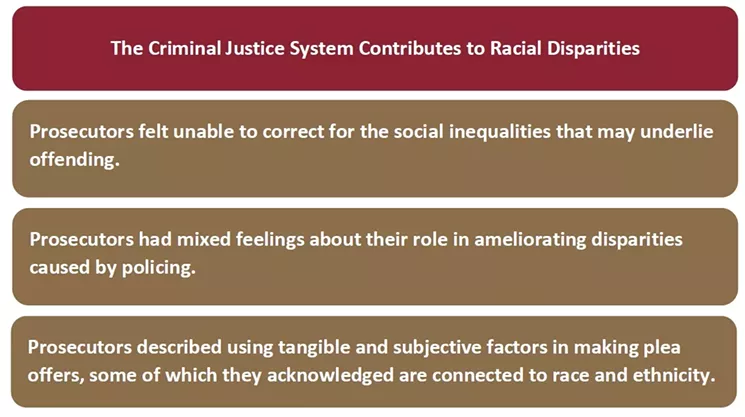"I don't know what the solution is," one anonymous subject stated. "I would like to think that the solution occurs before it hits our table. I think the institutional racism happens because of the situations people are placed in from a much earlier stage than when officers get there."
The report, "Racial Disparities in Prosecutorial Outcomes," was assembled by a team headed by Dr. Stacey Bosick. The researchers looked at administrative data case files for adult felony cases accepted for prosecution from July 1, 2017, to June 30, 2018, with four main areas of focus: prosecutorial discretion regarding plea agreements, dismissals, deferred judgments and referrals to drug court.
During that span, the DU crew determined that "race and ethnicity were not associated with charge reductions in plea agreements," according to the study. But issues were detected in the other three areas.
Cases were just as likely to be dismissed for Hispanic defendants as white defendants, researchers determined — but dismissals were much more likely for Black defendants than whites.
"Although the higher rate of dismissals of cases involving Black defendants might appear to suggest an advantage, it is important to note that these cases were initially accepted for prosecution," the authors write. The obvious inference: Black defendants appear more likely to be prosecuted in cases that would have been dropped had they been white or Hispanic.
Likewise, cases involving white defendants that proceeded to the prosecution phase were more than twice as likely to be deferred than those of either Black or Hispanic defendants. And drug felony cases involving white defendants were more likely than those involving Black or Hispanic defendants to be heard in drug court, a concept created to decrease jail overcrowding, among other things.
That's no longer a problem: "The drug court that existed at the time of this study is no longer functioning," notes the study. "There were changes to Colorado drug laws in 2019, which lowered many drug charges from a felony to a misdemeanor, and the development of two new specialty courts in 2020 — developed by the DA's office, in cooperation with other court stakeholders to address addiction-motivated criminal behavior."
As for the other findings, the study's conclusion recommends the following:
• Reviewing cases and deciding which will be accepted — and taking steps to ensure that cases that will eventually be dismissed are refused from the start.For their part, the prosecutors interviewed for the study sometimes seem uncertain that they can improve the racial disparities detected by the researchers.
• Collaborating with Denver criminal justice system stakeholders to ensure eligibility requirements for deferred judgments, specialty courts, and diversion programs support equitable outcomes.
• Supporting further racial and ethnic diversity among their staff and new ways of supporting greater cultural awareness and understanding.
• Continuing to collect and review data to better understand the dynamic role of prosecution over time.
One admits: "In the law enforcement system as a whole, racism is, I think, obviously, and clearly apparent…in terms of neighborhoods that are policed more than others, contacts with defendants for less-than-ideal reasons that can, on paper, be written off as legitimate, but just don't pass the smell test." But another asks, "If we were to help them get all these services, would this person be committing crimes?…I think the problem and the very unfortunate limitation with the criminal justice system is a lot of times we don't have the ability to help with those services. We can't really help. We can give referrals, but we can't help people with housing and help people with homelessness and lack of education and all of those things that might lead up to them committing crimes in the first place."
And then there's the matter of economic inequities that can occur when well-off defendants, many of them white, can afford to hire their own lawyers rather than having to rely on public defenders, as so many Black and Hispanic defendants must.
"[Private attorneys] get paid a lot and have nothing better to do than to send you an email every other day, and present mitigation, and file motions that you have to respond to ad nauseam, and they will try to whittle you down," one interviewee said. "It does work. We have high caseloads. ... [The defendant] will pay half the restitution up front. Normally I would try to get this guy to go to prison, but you know, the victim is going to get half the money up front. That’s a big consideration."
As for potential cultural biases, one prosecutor comments: "It goes to the whole deep-seated issue of treating similarly positioned people similarly. You want people who committed the same types of crimes to get the same general punishment. But then, in practice, it’s really difficult because, you know, some people can articulate things better than others. Does that mean they’re not similarly treated? Or does that just mean that they’re getting a benefit? Because they can just speak better?"
McCann says she's "pleased but not surprised, that the report did not find racial or ethnic disparities in our overall plea bargaining and resolution of cases," but adds that "the report makes recommendations that I am committed to pursue and some of which were already under way prior to the report’s release. I look forward to further review of the areas noted."
Click to read "Racial Disparities in Prosecutorial Outcomes."













